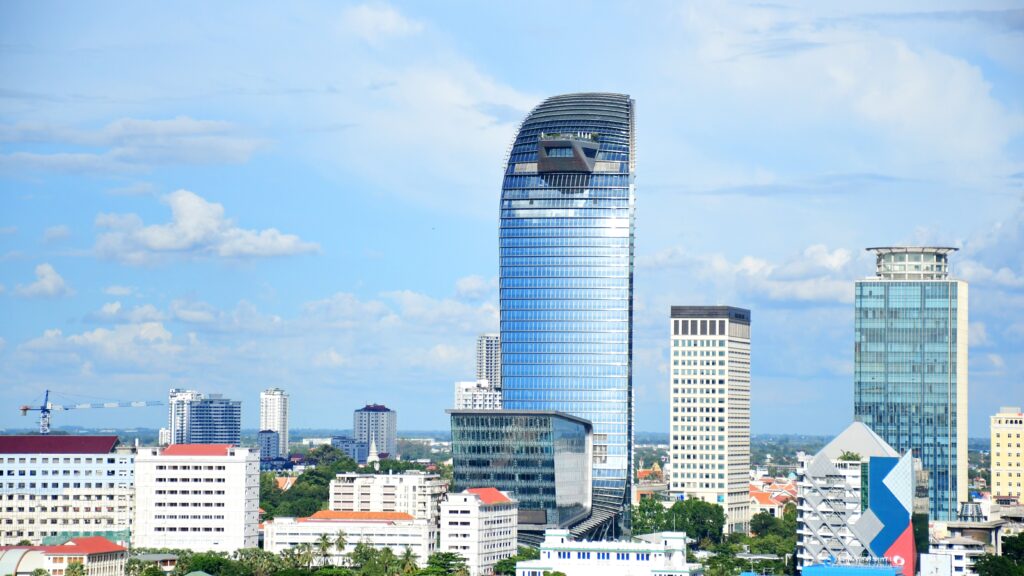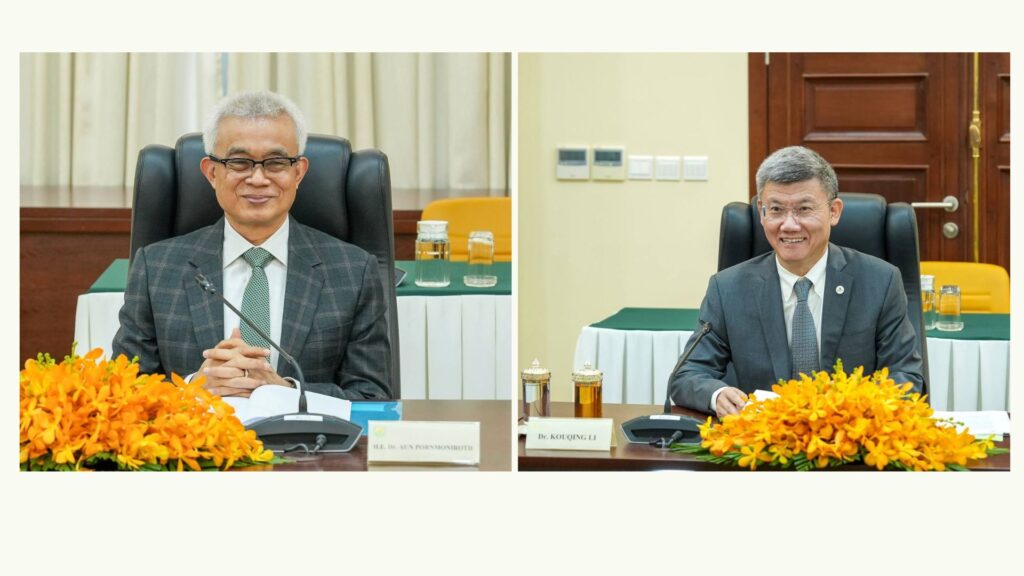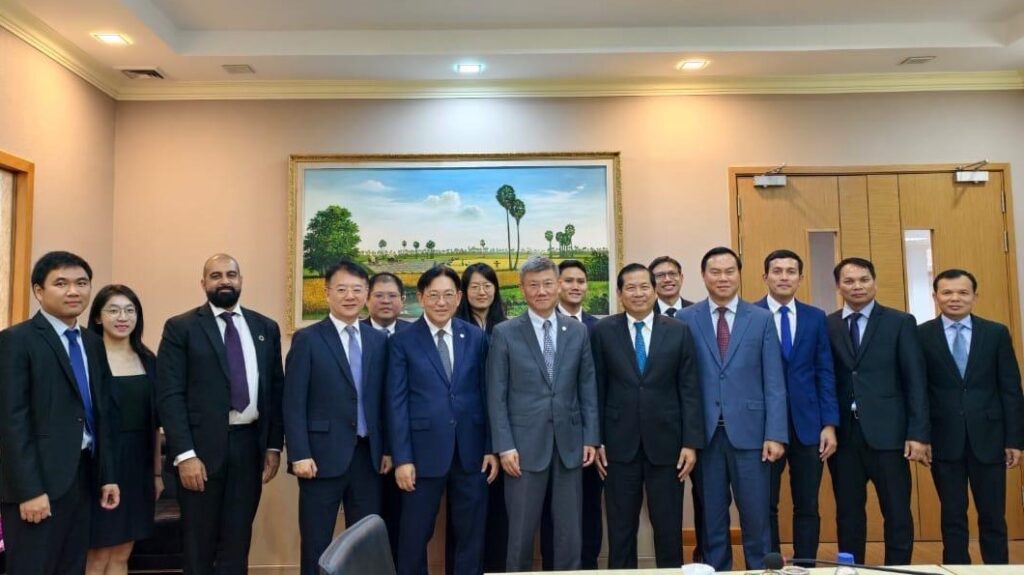
SINGAPORE, May 8, 2025 – Cambodia’s economic growth accelerated to 6.0 percent in 2024 from 5.0 percent in 2023, driven by a strong rebound in the garment sector. However, in light of unexpectedly high US tariffs, growth is expected to decelerate to 4.9 percent in 2025, due to its heavy reliance on exports to the US. A coordinated and multifaceted policy, including targeted fiscal support, and diversification of markets and industries, is needed to strengthen resilience amid escalating global trade tensions. Once external risks ease, attention should shift toward restoring fiscal space, mitigating financial risks, and advancing structural reforms to further diversify the economy.
These findings are based on the preliminary assessment by the ASEAN+3 Macroeconomic Research Office (AMRO) following its Annual Consultation Visit to Cambodia from April 21 to 30, 2025.
The mission was led by AMRO Principal Economist Jinho Choi. Policy discussions involved AMRO Director Kouqing Li and Chief Economist Hoe Ee Khor, and focused on Cambodia’s recent macroeconomic developments, outlook, risks and vulnerabilities, and policy recommendations to secure resilient growth and financial stability.
Economic developments and outlook
“Due to the sharp rise in tariffs on its goods export to the US, Cambodia’s economic growth is expected to decelerate to 4.9 percent in 2025 and 4.7 percent in 2026,” said Dr. Choi. “However, the economy is resilient and the government should take targeted measures to support the economy, especially the affected sectors.”
Inflation in 2024 was highly volatile, driven primarily by food prices. While consumer price index (CPI) inflation fell sharply in 2024, averaging 0.8 percent, it spiked in the first two months of 2025. Inflation is forecast at 2.7 percent in 2025, before moderating to 2.2 percent in 2026, returning to pre-pandemic levels.
The current account surplus narrowed to 0.5 percent of GDP in 2024, reflecting a wider trade deficit. It is projected to shift into a deficit of 3.6 percent of GDP in 2025 and 5.5 percent in 2026. FDI inflows are expected to decline slightly in 2025 amid investor caution, before recovering in 2026.
The real estate sector remained weak in 2024 as it is in the early phase of recovery. Meanwhile, credit growth remained low at around 3 percent in 2024, despite ample liquidity supported by strong deposit growth.
On the fiscal front, revenue collection in 2024 fell significantly short of the budget due to sluggish tax collection. In response, the government cut spending which narrowed the fiscal deficit to 2.1 percent of GDP in 2024 from 3.9 percent in 2023.
Risks, vulnerabilities, and challenges
As a small, open economy, Cambodia is highly exposed to external shocks, compounded by domestic financial sector vulnerabilities and long-term structural challenges.
The most pressing concern is the uncertainty around the duration and magnitude of the new US tariffs—currently on hold for 90-days. Prolonged trade protectionism would depress growth in major economies, further weighing on Cambodia’s economy through investment and trade channels.
Domestically, a continued increase in non-performing loans (NPLs) amid subdued credit growth could erode bank profitability and capital adequacy. Weak financial positions of some real estate developers could further heighten credit risks.
In the long term, Cambodia’s graduation from least developing countries status in 2029 could diminish export competitiveness and raise borrowing costs, unless managed proactively.
Policy recommendations
As Cambodia grapples with the fallout from escalating global trade tensions, a multifaceted policy response is urgently needed to enhance economic resilience.
In the short term, targeted fiscal support and flexible monetary policies—carefully calibrated—can sustain economic activity. Strengthening regional cooperation will also be key to improving bargaining power and fostering intra-regional trade. Over the medium term, export diversification and improvements in domestic competitiveness should be prioritized.
The revenue shortfalls in 2023-2024 highlight the urgent need for swift implementation of the new revenue mobilization strategy. Stronger alignment between policy objectives and budgeting, along with more efficient public spending, is critical.
The National Bank of Cambodia should maintain its accommodative policy stance to foster liquidity conditions and support the economy. At the same time, the current regulatory forbearance measure to allow more time for banks to address NPL problem should be time-bound to avoid moral hazard. The authorities should strengthen financial stability by enhancing the macroprudential policy framework and establishing frameworks for the deposit insurance scheme, banking resolution, crisis management, and emergency liquidity assistance in the near term.
The authorities’ commitment to fostering high-quality, sustainable, and inclusive growth is commendable. Realizing this vision requires concrete, targeted, and well implemented policies to support underperforming sectors, strengthen competitiveness, and accelerate diversification.
The AMRO team thanks the Cambodian authorities and all participating organizations for their cooperation and candid engagement during the mission.
About AMRO
The ASEAN+3 Macroeconomic Research Office (AMRO) is an international organization established to contribute toward securing macroeconomic and financial resilience and stability of the ASEAN+3 region, comprising 10 members of the Association of Southeast Asian Nations (ASEAN) and China; Hong Kong, China; Japan; and Korea. AMRO’s mandate is to conduct macroeconomic surveillance, support regional financial arrangements, and provide technical assistance to the members. In addition, AMRO also serves as a regional knowledge hub and provides support to ASEAN+3 financial cooperation.

AMRO Director Kouqing Li met with H.E. Dr. Aun Pornmoniroth, Deputy Prime Minister and Minister of Economy and Finance of Cambodia.

AMRO Director Kouqing Li, Chief Economist Hoe Ee Khor, and the AMRO team met with H.E. Rath Sovannorak, Deputy Governor of the National Bank of Cambodia (NBC) and other senior officials from the NBC.
